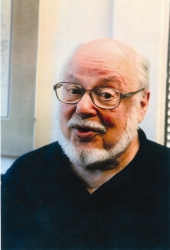By Amanda McGregor
The Phantom Tollbooth by Norton Juster has delighted generations of children (and grown-ups, too) with its concise prose and profound ideas about a little boy named Milo on a fantastical quest. First published in 1961 and illustrated by Jules Feiffer, the story features a young protagonist who believes “almost everything is a waste of time” until he discovers a magical tollbooth in his bedroom that whisks the bored boy away to the land of Expectations. From there, he sets out on a journey full of puzzles, word play and encounters with quirky characters, as he surmounts the Mountains of Ignorance, maneuvers through the Doldrums, and ultimately rescues the Princesses of Rhyme and Reason.
This month, Juster’s tale comes to life in a musical adaptation at the Wheelock Family Theatre in Boston in honor of the book’s 50th anniversary. Juster, 82, approached Wheelock to put on the production, which premiered as a play at The Kennedy Center in Washington, D.C., in 2005.
The author, who is a retired professor of architecture and environmental design at Hampshire College, lives in Western Massachusetts with his wife, Jeanne. He will be in Boston for opening weekend and sign books after the show on Oct. 22. (The show runs Oct. 21 to Nov. 20.)
Here, Juster tells us why his book still captivates kids 50 years since its publication.
1 When you wrote The Phantom Tollbooth, did you know it would be a success?
The Tollbooth was, of course, a transforming experience. First of all, it was the first thing I published, and it was mainly published because I was so ignorant. It wasn’t submitted in a conventional way: it was given to an editor who wasn’t a children’s editor, and it had a vocabulary that horrified most people involved with children’s literature because it was too difficult. It did everything wrong.
The general theory at the time was that no child should ever pick up a book and find in it anything he didn’t already know about, so they tended to discourage any kind of interesting plots or stories or conflicts. To top it off, they said fantasy was bad for children because it disorients them.
The funny thing is, of course, is that everything I did for that book was done because I didn’t know any better. A great truth in life is, what keeps you going sometimes is if you don’t know any better.
2 Were you afraid the book would be too difficult for children?
When it first came out, they said it was only for bright children, but that’s not the case.
I think we sometimes do a disservice to our kids when we try to steer them into the things we think they will understand. Kids understand a lot more than we have any idea, and we tend to short circuit that by trying to censor. Let them run amok.
There is a wonderful old Peanuts cartoon in which Charlie Brown and Lucy are discussing poetry, and one is saying to the other, “But how do you know what it means?” and the other says, “Somebody tells you,” and that, to me, is the death of education.
You don’t tell people. You try to make people see what they think, because they are very different and very wise in their own way.
3 Did you have a favorite book as a child?
I had an aunt who every Christmas and birthday gave me one of the Oz books. It was a series of many many books written by L. Frank Baum, and they were the most important books in my life. They started me thinking in this wonderful, imaginative way, and made things possible that you knew were not possible – but then again, they were.
4 Why do you think Phantom Tollbooth continues to resonate with readers half a century later?
Because I think certain things don’t change. What it deals with are still the basic issues for kids in life. Kids are insecure; they don’t have completely developed powers of logic and reasoning; they are fearful of things; they are resentful of things – every kid in every generation.
I still get people who write me and tell me they have read it recently and it’s completely up-to-date to them and deals with things they have thought about or are dealing with. And I like that very much.
5 Do you have advice to children and parents on reading?
I would tell parents not to get too concerned that their children are reading the “right” things, whether it’s the back of cereal boxes to erudite pieces of literature. When I was growing up, the great bugaboo – the thing that was going to destroy you – was reading comic books, which was absolute garbage educational theorists had put on.
One thing that bothers me now is the constant pressure for kids to read earlier and earlier. A lot of people want to get their 3-year-old kids into perfect pre-kindergarten, then the perfect kindergarten, up the line to Yale and Harvard, and it’s just a very mistaken idea. What you want to do with your kids is to let them roam around not only the world, but to roam around their own head, and not immediately tie them into patterned structured ways of doing things.
Everything in the book – all the crazy ideas and the crazy misconceptions – are part of the way I used to turn things upside down and around in my mind when I was growing up. Sometimes I would say a word over and over again until I suddenly realized it didn’t have any meaning anymore, but I just liked the sound of it. Or I wondered, “What does a word taste like, or a number?”
Word play is wonderful because it changes language, changes your understanding, and opens up the way you perceive things in a completely different way. Milo’s movement through life – his awakening and discovery of things – is how he shapes these things.
Amanda McGregor is a freelance writer who lives in Somerville.




















